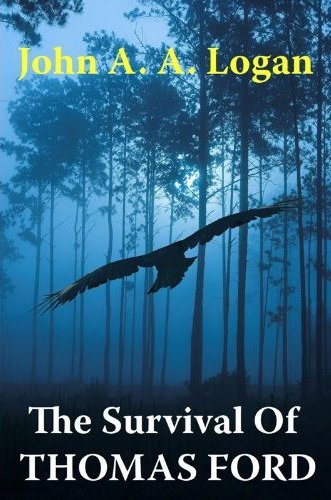The premise for the book is simple.
The novel’s story takes place in a Scottish, mountaneous town near a loch. Thomas Ford and his wife are riding in his car when suddenly they come up to a blind curve just as two men are coming at them from the other way while trying to pass a truck. To avoid a high-speed collision, Thomas drives his car into the lake below, only to kill his wife and succumb to a six-week coma. When he comes up from the coma, the reader discovers that the driver who caused the reckless accident, Jimmy, is mentally unstable, to put it mildly. Jimmy decides that, in order to protect himself and his father’s established house-building business, he needs to kill Thomas Ford.
From the moment you discover Jimmy dancing in the night, naked, wearing only his girlfriend’s thigh-high boots, you know there’s something off in Jimmy’s head. And his father is no saint, either, often brutalizing his son to verbal and very violent, physical abuse.
The plot itself is simple, but I’ve always been a character-first and quality-prose fan myself, and this novel excels in both. The prose is very satisfying. Literary and yet very legible.
I often found myself highlighting lines that deserved recognition. Like this one:
There was something in her eyes that Jimmy didn’t like, something lazy and satisfied, the look of a lioness that had just fed.
Or this one:
Lorna sneered and laughed loudly. To Thomas it felt like someone had just run a cheese grater across his soul.
The conflict between characters, even among father and son, are beautifull balanced. This novel is all about those fighting tendencies and inner conflicts that humans face. From a father who knows his son is psychologically troubled (and stomps on his chest so badly that Jimmy ends up in the hospital), and yet sets out to protect him at all costs; To Thomas, who loved his wife and tried to save her when the car went underwater, but she frantically shoved his arm away in the midst of her panic.
Jimmy’s father had understood that something was very wrong with Jimmy, but understanding had a to wage a daily battle against parental hope.
Minus a few puzzling grammatical/formatting mishaps (sometimes there was a space between the end of a sentence and a period), it was hard to believe that this book hadn’t been published via a traditional publishing house. Logan writes about that frustrating, disappointing process on his blog here, which is a very interesting and humbling read.
There’s also an undercurrent theme that takes place throughout the novel which I found beautiful. Not only was there that constant back-and-forth tension between characters and their relationships with each other, but there was also an outer force that worked against their will also.
For example, the novel begins with Thomas and his wife pausing on the road to inspect a crack in the road. Thomas notices a mysterious gas emitting from the ground. At first, this seems like a trivial occurrence, only to play a greater part in the novel’s theme (and the crash) later on.
Characters often find themselves moving or being frozen/prevented from acting against their better judgment or desires. It’s as though Logan, the author, himself is toying darkly with his characters, but only for the greater purpose of the novel’s movement.
In one scene, on the day Thomas is released from the hospital, he’s riding in a car with a friend and recognizes Jimmy, the man who was responsible for killing his wife. Thomas jumps out of the car to chase after Jimmy, but a terrible, animalistic pain chews on his chest. This is as if the greater, hidden force (perhaps the author himself ) were to say, “Not yet, Thomas. It’s not quite time for you to confront him. There’s a bigger monster we must take care of first.”
The only thing that bothered me about the novel, and this only slightly, is that Thomas, who is (by the title’s admission) the novel’s chief character, seems to be the least active of all the characters involved in the story. Jimmy is on the hunt for Thomas. Lorna, who is Jimmy’s girlfriend, blackmails Jimmy’s father when she discovers Jimmy is responsible for the crash. Same with a few other minor characters. They seem to be more in motion than Thomas himself.
But I justified this aspect of the book with a few thoughts in mind:
1) Thomas just came out of a 6-week coma and isn’t in the best condition to do a lot of action.
2) Even when Thomas does try to act, that mauling pain takes over his chest. Which, I took to enforce the reoccurring theme of the novel: the struggle between man’s will and the will of the universe. How, ultimately, man is just an atom crashing around in a glass filled with millions of others (Not that this exact philosophical idea is a position I take myself, but it is one I respect in the novel).
Final Verdict:
This novel deserves five stars, and readership. It is on par with most mainstream literary works I’ve read. It is literary first, which forces the reader to appreciate the subtleties behind the characters’ thoughts, motives and actions, but it is gripping enough to be a dark thriller.
 Michel Sauret – Award-Winning Army Journalist | Independent Author Award-Winning Army Journalist, Independent Author
Michel Sauret – Award-Winning Army Journalist | Independent Author Award-Winning Army Journalist, Independent Author









Thanks very much, Michel!
It was fascinating to see the book, and its themes, through your eyes, and I’m very honoured that you thought so much of the novel.
The most that can be hoped for is that the reader journeys deep into the heart of the story, and you have certainly done that here.
Thank-you.
John
John,
It was an absolute pleasure to read. I read this novel much faster than I read most fiction (I’m a terribly slow reader), and I kept wanting to get through it. I’m really thankful that I stumbled upon this work, and I hope to share it with others also! My hope is that this review might bring you more readers.
Let’s hope!!
Michel